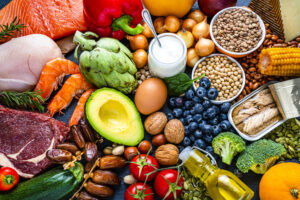
Kyle Dardashti tried numerous options — including pharmaceutical drugs — to treat his Crohn’s disease, which causes inflammation in the digestive tract. But none of these options worked — until his doctor recommended the Specific Carbohydrate Diet, a diet that can treat Crohn’s disease. The experience later led him to help create Los Angeles-based Heali, a food as medicine startup focused on combating chronic diseases that launched Thursday with $3 million in seed funding.
“[My doctor] said, ‘There is a diet testing as effective as the pharmaceutical drugs that you’re on and if you’d like, you can give that path a try.’ … After about three or four months, I felt healthier than I’d ever felt. I got my life back,” Dardashti said. “Through that process, I became really fascinated with this concept of medical nutrition therapy, this idea that there are different therapeutic dietary protocols that can treat and manage different conditions.”

With the Rise of AI, What IP Disputes in Healthcare Are Likely to Emerge?
Munck Wilson Mandala Partner Greg Howison shared his perspective on some of the legal ramifications around AI, IP, connected devices and the data they generate, in response to emailed questions.
Heali’s AI-driven app offers personalized nutrition plans for more than 200 chronic conditions, including diabetes, allergies, autoimmune issues and gastrointestinal issues. These plans take into account the user’s goals, preferences, weight, activity level and dietary restrictions. The AI models are trained to connect health conditions to certain dietary protocols beneficial to those conditions, and can evaluate whether certain foods are good, fair or bad for that condition. Users can also access nutrition studies that explain the benefits of certain foods, as well as recipes that fit their diet.
In addition, the app allows users to plan out their meals and track their progress. The app also has a scanner that can be used on items while grocery shopping. The scanner will say whether the product matches the user’s diet and will offer replacement options if it doesn’t match.
Heali is selling its app mostly to providers (including Boston Heart Diagnostics), who can recommend the app to its patients needing dietary support. It is also working with Blue Shield of California and aims to work with employers in the future, according to Dardashti. While Heali’s focus is B2B, consumers can also access the app directly. For the direct-to-consumer option, the app is currently free but will cost $15 a month or $75 annually down the line.
The $3 million in seed funding was led by Astanor Ventures, which chose to invest in Heali because it is “advancing personal care by offering an accessible and affordable way for anyone, anywhere, to leverage food as medicine and achieve sustainable nutrition practices,” said George Powlick, partner of the firm, in a statement.
With the financing, Heali is focused on commercialization and growing its customer base, Dardashti said. The company also has plans to offer health coaching and meal kit delivery options in the future.
Heali has already achieved results as well. The platform received recognition from the CDC, which is given to companies that meet certain quality standards, such as using a CDC-approved curriculum. A clinical trial on patients with irritable bowel syndrome found that Heali users’ symptoms improved two times more than those who didn’t use Heali. Symptoms of IBS include abdominal pain and cramping, diarrhea and bloating.
The food as medicine movement has been rising in popularity recently, leading many companies to enter the space. Another company is Season Health, which offers clinical nutrition care, meal recommendations, education and food delivery. NourishedRx is also a food as medicine company and offers medically-tailored meals, grocery support and diet education.
In launching Heali, Dardashti said he ultimately aims to live in a world where “food isn’t an afterthought” and is a key part of treatment for patients.
Photo: fcafotodigital, Getty Images














